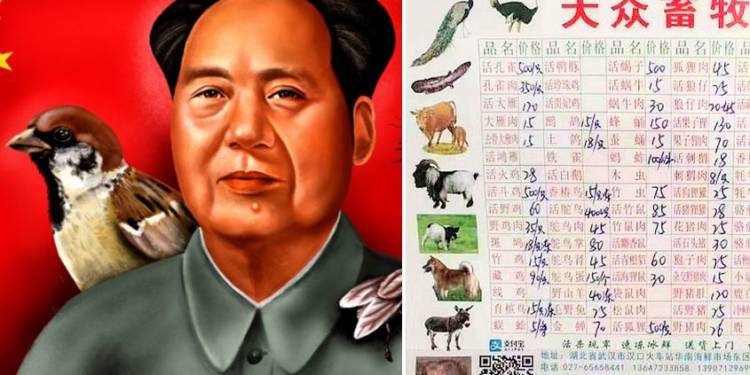While the Coronavirus outbreak continues to grip the entire world having killed more than 42,000 people and infected more than 8,50,000 people worldwide, unsanitary wet markets in China- the origin of the deadly COVID-19 have reopened after the country recently declared victory over the novel Wuhan virus.
Meanwhile, China’s obsession with traditional medicine that relies upon the idea of using wildlife for medical treatment has also led to the country promoting bear bile as the Coronavirus treatment.
That China should reopen its unsanitary wet markets and continue promoting its traditional-wildlife related medicine, despite the COVID-19 gripping the entire world reveals how wildlife consumption is deeply embedded into the Chinese culture.
The Chinese obsession with consumption of wildlife and exotic animals can be essentially traced back to the Four Pests campaign- one of the first actions taken in the “Great Leap forward”. The thrust of this campaign was to eliminate four pests, viz. rats, flies, mosquitoes, and sparrows.
Also known as “Smash Sparrow”, this campaign launched in the year 1958 by Mao Zedong is the worst ecological disaster known to mankind. Mao felt that sparrows ate too much grain and China could do without such pests. Thus, he decreed that all sparrows be killed.
There is no official estimate as to how many sparrows were killed as a part of this campaign, but since the “People’s Republic” mobilised people of the country to eradicate birds, we can easily estimate that even if everyone person killed at least one sparrow each, more than 600 million sparrows would have been killed, making it an extinct bird in China.
But within a year, China realised that sparrows ate not only grain but also pests, for example, they ate locusts. Chinese agriculture was hit badly with an exponential rise in insect infestations, including locust attacks. There were no sparrows left to predate them.
A famine naturally followed and people simply ran out of food. Even according to the conservative official estimates, 15 million people died, while some scholars peg the number of actual fatalities as high as 45 or even 78 million.
The 1958 “smash sparrow” campaign had many fallouts in Chinese culture, including murders of people for food and also ran Mao Zedong into a spot of bother. This is what also led to the 1962 Sino-India war given the backlash within his own country and millions of deaths directly attributable to his “Great Leap Forward”, Mao Zedong saw a “soft target” in India.
What the famine also did was to evoke an affection for consumption of wildlife and exotic animals. With the Communist regime which controlled all food production failing to feed the people of China, the government decided to give up its control and allowed private farming in 1978.
This is when small companies and individual peasants started to catch and raise wild animals, and when this started to eliminate hunger caused by Mao Zedong’s “Smash Sparrow campaign”, the Communist regime started to back it.
China was ready to allow whatever worked when it came to feeding people. But things went further when in 1988 China enacted the Wildlife Protection Law. This law declared, “Wildlife resources shall be owned by the state,” and also went further by stating that the State would protect the interests of those “engaged in the development or utilization of wildlife resources.”
What this meant was that the Communist regime in China actively protected those engaged in wildlife farming, as also those operating the wet markets where wildlife resources would be utilised.
And when wildlife is declared as “resources”, it essentially means that the State is looking to harness them in a way that benefits it economically. This is exactly what has been happening in China for the last four to five decades or so.
The law also made it incumbent upon the Chinese government to encourage wildlife farming, when it expressly stated, “The state shall encourage the domestication and breeding of wildlife.” This ultimately led to the birth of a humongous wildlife farming industry.
Small units went on to become virtual factories raising exotic animals at an industrial scale. These live animals then entered the wet markets of the country where human beings and a variety of animals, both living and dead, such as dogs, chickens, pigs, snakes, civets, etc would come into close contact with each other.
This interaction of animals makes it easier for viruses to pass on especially because the rampant slaughter of exotic species in close spaces makes it easier for fluids to mix. Viruses pass on easily within the wildlife and it is rare for a virus to pass from an animal to a human being.
What these wet markets however offer is a prolific opportunity for viruses to pass among animals and further to human beings. In case of COVID-19, for instance, it is believed that bats, which themselves are resistant to this novel virus along with millions of other viruses, passed it on to Pangolins from whom it reached human beings, and today lakhs are infected with it.
The rise of the wildlife domestication and farming industry in China, also led to the booming of an illegal wildlife industry outside the boundaries of China. Endangered animals like Tigers, Pangolins and Rhinoceros were trafficked into China.
Remember, that while poaching and trade in wildlife is illegal in most countries, it is essentially a part of the food production process in China. Within India, there have been reports about illegal trading of Pangolin scales from Bangalore clearly with a view to serve China’s massive wildlife farming and consumption industry.
In the Northeast, Assam, whose Kaziranga National Park has been home to one-horned Rhinoceros, has been in limelight for illegal trafficking of Rhino horns and Tiger parts to China apart from the recent surge in Pangolin trade.
Such illegal trade industry has become an entire racket fuelled by demand for exotic meats and use in Chinese traditional medicine, Tiger parts and Rhino horns for example are popular in traditional Chinese medicine.
This creates global and regional networks for illegal trafficking in critically endangered wild species. Trade of animals from Assam to the Yunnan province of China, for instance, passes through Manipur and Myanmar.
China’s love for exotic meat and the country’s obsession with traditional medicine that relies on harnessing wild animals as natural resources has made wildlife farming a massive industry. The industry promotes their consumption as products for enhancing immunity, boosting virility and bodybuilding. None of the claims, of course, have any scientific basis to rely upon.
Now, the Communist regime in China has been constantly looking at “wildlife domestication” as a means for rural development, eco-tourism and poverty alleviation, which explains why exotic meat has started selling again in the country while the world still battles the COVID-19 Pandemic.





























Our planet will only be free of problems and disasters once we become at peace with nature, animals and each other. Every living thing no matter how big or small has a heart and a soul and should be respected and appreciated. Every living thing has a role and is part of the delicate balance and interdependence of the ecosystem. If we continue to be destructive for the purpose of our survival we will not find the answers for a plentiful and peaceful existence. If we continue to cut down forests, use harmful pesticides, overfish the oceans, breed animals simply for consumption on mass scale, burn dangerous fossil fuels, create synthetic materials such as plastic and poison chemicals in the end we will destroy ourselves and our children and our children’s children. We will cease to exist. We rely upon the earth and everything within it for every breath and every mouthful of water or food. To work in harmony with nature we must rely on natural green and blue energies such as wind, solar and hydro. We should stop the production of synthetic chemicals and materials such as plastic and pesticides and any harmful nuclears. If we want peace, health, happiness and wealth we must do these things and do them now.
shush
We should not ignore the massive cruelty , lack of empathy , lack of love, stone hearted people that cannot see what jewels animals are. This gets no media coverage because every thing is human centered. This is the great sin of this specie, but the chinese have taken it to a horrible level. Just imagine these creatures undergoing this kind of life. They are different from western culture in a way that cannot be bridged.
Well said, Esther.